

![]() More info about [ This Release | Floral Magician Mary Bell ]
More info about [ This Release | Floral Magician Mary Bell ]

![]() More info about [ This Release | Floral Magician Mary Bell ]
More info about [ This Release | Floral Magician Mary Bell ]

![]() More info about [ This Release | Goldfish Warning! ]
More info about [ This Release | Goldfish Warning! ]

![]() More info about [This release | Fushigiboshi no ☆ Futagohime ]
More info about [This release | Fushigiboshi no ☆ Futagohime ]
The first half of Episode 21 is Gyopisel and Gretelcow. The title is not only a parody of Hänsel und Gretel, but is a pun. (Read more...)
NOTE: This is Episode 21 on DVD, but was originally Episode 20. The original Episode 21 is numbered 20 on DVD.
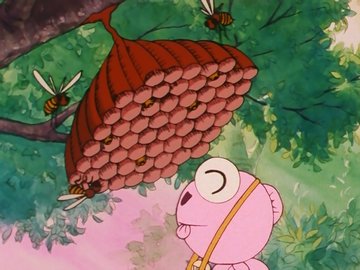
![]() More info about [ This Release | Goldfish Warning! ]
More info about [ This Release | Goldfish Warning! ]
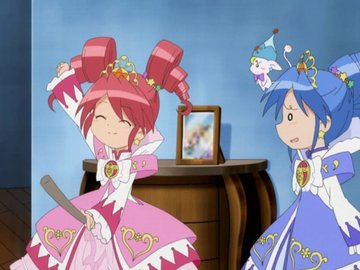
![]() More info about [This release | Fushigiboshi no ☆ Futagohime ]
More info about [This release | Fushigiboshi no ☆ Futagohime ]
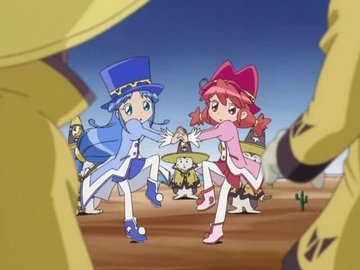
![]() More info about [This release | Fushigiboshi no ☆ Futagohime ]
More info about [This release | Fushigiboshi no ☆ Futagohime ]
Our QCer is strict about everything, not only about grammar and spelling, but also about punctuation, etc.
Today, I was asked to remove the comma in "[She] goes down to earth, when the first snow falls." Whether or not to put a comma before the adverbial cluase is a bit confusing, so, for future reference, I'll try to summarize the problem here.
If the adverbial clause is at the beginning of the sentence, put a comma after it. If the adverbial clause is inserted in the middle of the sentence, put a comma before and after it. These two rules are very clear. The problem is...
When the adverbial clause is at the end of the sentence:
Punctuation 3.4b Commas with Adverbial Clauses (The Basic Elements of English, English Department University of Calgary)
Adverbial clauses placed at the end of a sentence are a little more tricky. Whether the adverbial clause is punctuated or not depends on whether it is restrictive or non-restrictive.
If the adverbial clause identifies the circumstances of a situation more precisely--that is, if it is a restrictive adverbial clause--no punctuation is needed.
Bus ridership has decreased since the fares were increased.
If the adverbial clause simply provides more information about the situation--information that is not essential to the meaning of the sentence--it is a non-restrictive clause. Non-restrictive adverbial clauses are punctuated with commas.
I broke my arm in the spring of 1994, just before final exams.
Rules for Comma Usage (The Guide to Grammar and Writing, Capital Community College Foundation)
When an adverbial clause comes later on in the sentence, however, the writer must determine if the clause is essential to the meaning of the sentence or not. A "because clause" can be particularly troublesome in this regard. In most sentences, a "because clause" is essential to the meaning of the sentence, and it will not be set off with a comma:
The Okies had to leave their farms in the midwest because the drought conditions had ruined their farms.
Sometimes, though, the "because clause" must be set off with a comma to avoid misreading:
I knew that President Nixon would resign that morning, because my sister-in-law worked in the White House and she called me with the news.
Without that comma, the sentence says that Nixon's resignation was the fault of my sister-in-law. Nixon did not resign because my sister-in-law worked in the White House, so we set off that clause to make the meaning clearly parenthetical.
Punctuation Guide (English 210 Syllabus, J. Mark Baggett, Associate Professor of English & Law Department of English, Samford University)
But when you reverse these sentences and put the adverbial clause at the end of the main clause, you do NOT necessarily need a comma. If the adverbial clause is restrictive and limits the action of a verb to a time, manner, or circumstance), you need no comma. If the adverbial clause is nonrestrictive (i.e., it simply supplies additional information), you use a comma between the independent clause and the adverbial clause.
Clauses introduced by if are always restrictive and are not set off by commas:
A conclusion may be found if the two sides meet today.
[I believe that there are exceptions. Apparently, the if-clause in the following example is parenthetical and non-restrictive.
It was a perfect cover-up, if I do say so myself-pumo. ]Clauses introduced by because and unless are usually restrictive, but they can be nonrestrictive:
He missed class because he was sick.
When clauses beginning with after, as, before, since, when, and while restrict the time of the main verb, they should not be set off with commas:
The trailer entered the parking lot as the game was ending.
Morton was drinking beer while he was driving the boat.
When adverbial clauses beginning with as, since, or while do not restrict the time of the verb but rather express cause or condition, they are nonrestrictive and should be set off by commas:
Souter returned to the scene of the accident, as he wanted to get his story straight.
Venable was unable to read the contract, since she had had eye surgery only two days earlier.
Clauses introduced by the adverbs although and though are always nonrestrictive, so they must be set off with commas:
He admitted that he cheated on his taxes, although he claims his accountant misled him.
Other examples:
The judge set the case for trial because the parties could not settle.
The neighbor was a frequent visitor although the victim lived alone. [This although is almost like while or and.]

![]() More info about [ This release | Hime-chan’s Ribbon ]
More info about [ This release | Hime-chan’s Ribbon ]
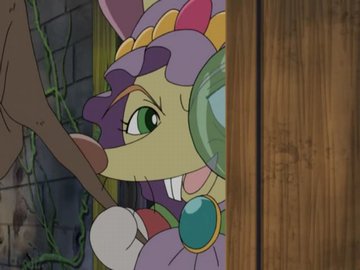
![]() More info about [This release | Fushigiboshi no ☆ Futagohime ]
More info about [This release | Fushigiboshi no ☆ Futagohime ]

![]() More info about [
This Release |
Floral Magician Mary Bell ]
More info about [
This Release |
Floral Magician Mary Bell ]
NOTE: This is Episode 20 on DVD, but was originally Episode 21. The original Episode 20 is numbered 21 on DVD.

![]() More info about [ This Release | Goldfish Warning! ]
More info about [ This Release | Goldfish Warning! ]

![]() More info about [This release | Fushigiboshi no ☆ Futagohime ]
More info about [This release | Fushigiboshi no ☆ Futagohime ]

This is our third multisub project following The Star of Cottonland (SoC), and by the way our 184th release.
Unlike SoC, which fans called a hidden gem, or amazingly rare gem of a movie, Minky Momo is already relatively well-known; we hope you will enjoy this release anyway.
The anime itself is quite high-quality, but the DVD was not authored so perfectly. As always, we did our best to cope with the problematic frames, manually one by one.
Unfortunately, we couldn't find any Spanish translators for this multisub. Also it would have been nice if we could add Korean, since Minky Momo is quite popular in Korea...
![]() More info about [ This release | Minky Momo OVA ]
More info about [ This release | Minky Momo OVA ]
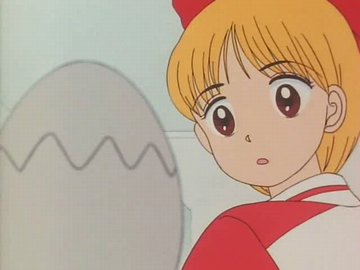
![]() More info about [ This release | Hime-chan’s Ribbon ]
More info about [ This release | Hime-chan’s Ribbon ]

![]() More info about [
This Release |
Floral Magician Mary Bell ]
More info about [
This Release |
Floral Magician Mary Bell ]
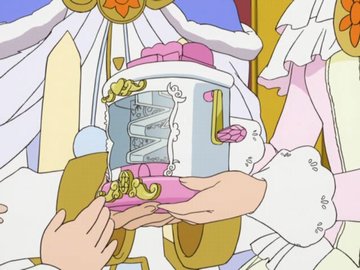
![]() More info about [ This release | Fushigiboshi no ☆ Futagohime ]
More info about [ This release | Fushigiboshi no ☆ Futagohime ]
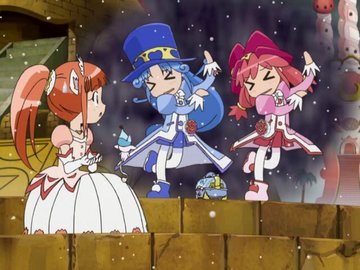
![]() More info about [ This release | Fushigiboshi no ☆ Futagohime ]
More info about [ This release | Fushigiboshi no ☆ Futagohime ]
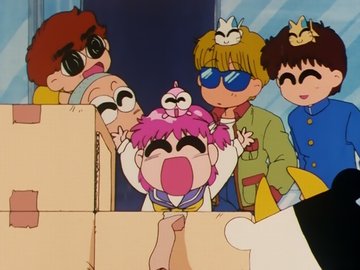
![]() More info about [ This Release | Goldfish Warning! ]
More info about [ This Release | Goldfish Warning! ]

![]() More info about [ This release | Hime-chan’s Ribbon ]
More info about [ This release | Hime-chan’s Ribbon ]

![]() More info about [ This release | Hime-chan’s Ribbon ]
More info about [ This release | Hime-chan’s Ribbon ]

![]() More info about [ This Release | Floral Magician Mary Bell ]
More info about [ This Release | Floral Magician Mary Bell ]
2007-03-02 Apparently, Aniverse was down again, from around 12:12 to 11:51 UTC.
2007-02-28: irc.aniverse.com (kanami.aniverse.com) was down from 09:00 to 12:30 UTC. It is up again now. If you are still having trouble, try the numeric address 66.207.164.29 instead of irc.aniverse.com. Also check the current status.

![]() More info about [ This Release | Goldfish Warning! ]
More info about [ This Release | Goldfish Warning! ]
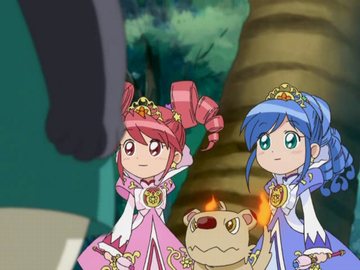
![]() More info about [ This release | Fushigiboshi no ☆ Futagohime ]
More info about [ This release | Fushigiboshi no ☆ Futagohime ]

![]() More info about [ This release | Hime-chan’s Ribbon ]
More info about [ This release | Hime-chan’s Ribbon ]
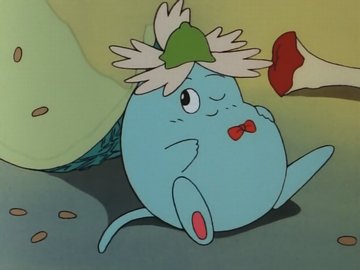
![]() More info about [ This Release | Floral Magician Mary Bell ]
More info about [ This Release | Floral Magician Mary Bell ]
As our next (and the third) multisub project after The Star of Cottonland, we are starting to sub a Minky Momo OVA, Yume ni Kakeru Hashi or The Bridge over Dreams (38 mins, 1993). If you are interested in anime we are doing, and would like to add your language, please join #honobono @ irc.aniverse.com and talk to an op.
We would like to do Minky Momo TV Series (1st) in the near future if another group doesn't do it, but that will be after we finish Floral Magician Mary Bell (currently doing 39 and 40, and the last is 50, so about 10 to go). For now, we will just do one or two of Minky Momo OVAs.

![]() Read more...
Read more...
The reason Aoi is not good at swimming is not explained in this episode. Nekobe Neko gave a short explanation about it in the original manga (Episode 5, Gyopi-chan Kiki Ippatsu).
![]() Read more...
Read more...
Snufkin is a character from the Moomin series, children's books by Finnish writer Tove Jansson, originally published in Swedish. For some reasons, Moomin is VERY popular in Japan. Snufkin is a vagabond everyone loves. The doll in Himeko's room should be Snufkin.
![]() Read more...
Read more...
SMAP is a now very popular Japanese "idol" group. Their debut was in 1991 and HCR was first aired in 1992–93, and back then SMAP was not so popular nor well-known as they are now. HCR's OP and 3 EDs are all their songs. Not only that, but Kusanagi Tsuyoshi did seiyū for Hasekura-senpai (Hasekura kōichi), the person Himeko had a secret crush on.
![]() Read more...
Read more...

 Annexes
Annexes
![]() More info about [ This release | Hime-chan’s Ribbon ]
More info about [ This release | Hime-chan’s Ribbon ]

 Annex
Annex
![]() More info about [ This Release | Goldfish Warning! ]
More info about [ This Release | Goldfish Warning! ]
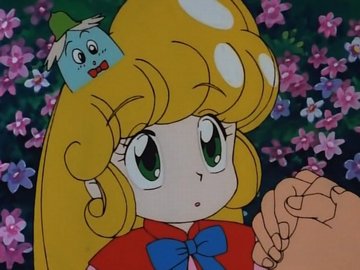
![]() More info about [ This Release | Floral Magician Mary Bell ]
More info about [ This Release | Floral Magician Mary Bell ]

![]() More info about [ This release | Fushigiboshi no ☆ Futagohime ]
More info about [ This release | Fushigiboshi no ☆ Futagohime ]
Meet Chibi-neko again! This anime is old and new. More info.
Changes from v1 include:
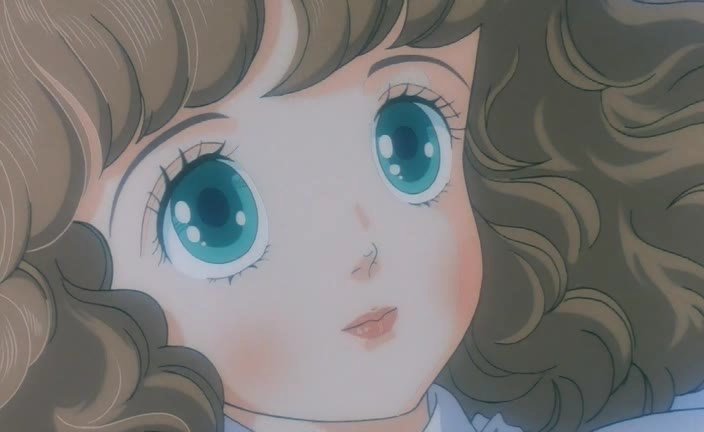

821C DADD 2C25 C86C 1754 6412 DD33 0238 68B5 8C64]![]() Our website is Tor-friendly & JavaScript-free.
Our website is Tor-friendly & JavaScript-free.